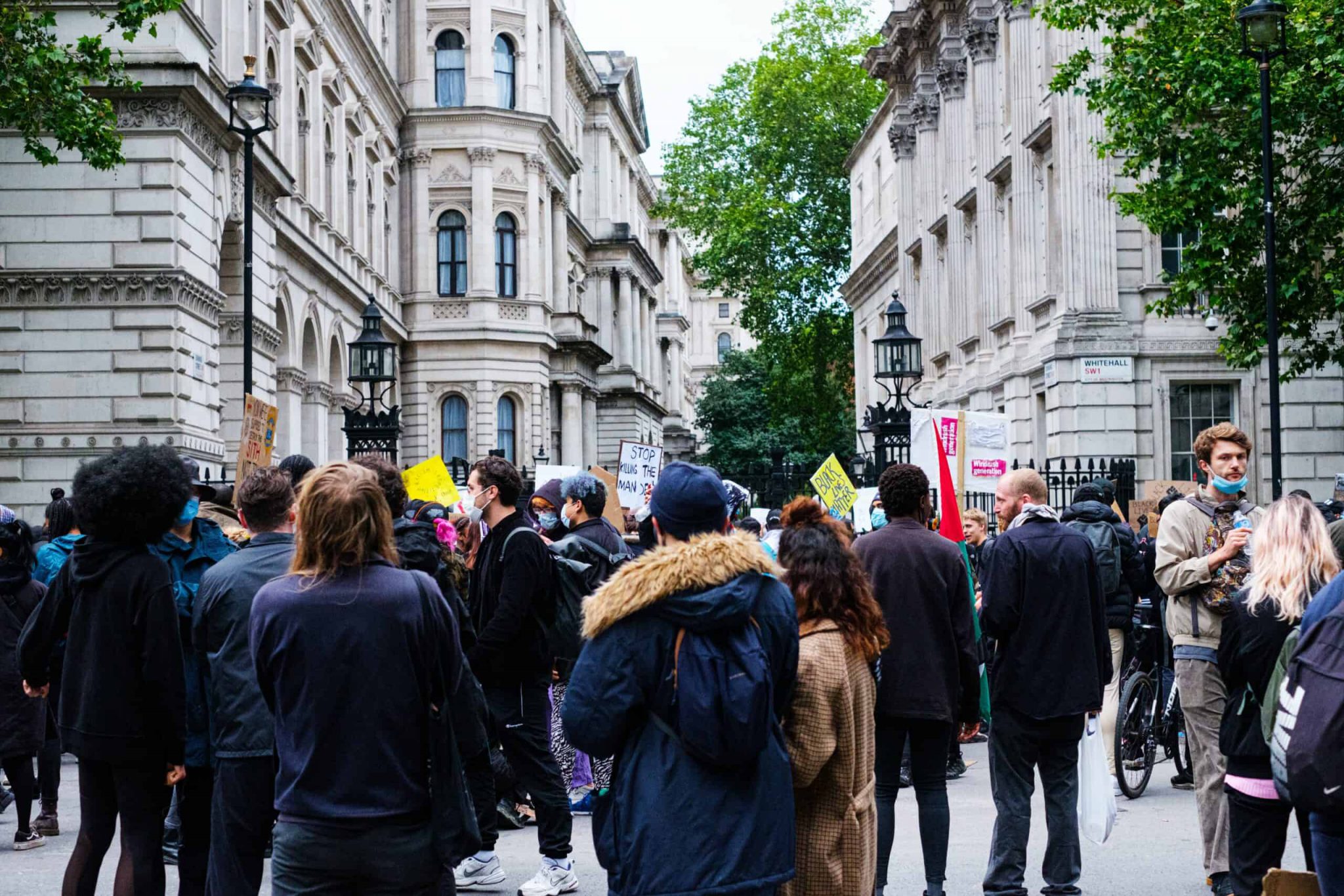
Jason Vazquez is a staff attorney at the International Brotherhood of Teamsters. He graduated from Harvard Law School in 2023. His writing on this blog reflects his personal views and should not be attributed to the IBT.

Tiran Bajgiran is a student at Harvard Law School.
Last July, the UK government adopted a new law enabling employment agency staff — workers employed by private staffing firms to fill temporary positions at other businesses — to replace strikers, which effectively amounts to state-sanctioned strike breaking. “This was a criminal offence. Now it’s an option for business,” candidly tweeted business secretary Kwasi Kwarteng, perhaps letting slip more than intended about his policy attitude towards the working class.
For until recently UK law prohibited temporary agency staff to cover for striking workers. This practice was considered a criminal offense, subject to an unlimited fine. Now, the law turns it into a business opportunity, while raising the maximum damages that judges can award against ‘unlawful’ strikers — for large unions, the cap quadruples from £250,000 to £1 million. Many employers and recruitment agencies themselves oppose the new law. Not only does the new legislation undermine the bargaining position of workers, and indeed the point of having a strike in the first place, but also, according to Neil Carberry, chief executive of the Recruitment & Employment Confederation, it puts agency workers in an invidious position if they have to cross picket lines.
Nonetheless celebrating are Conservative legislators, for whom state-sanctioned striker-replacement marks “an important milestone reflecting the government’s determination to minimise the power of union bosses,” who supposedly “hold the country to ransom.”
1. Backdrop: Summer of Discontent
The law is a response to the UK rail strikes of this summer, as workers, facing a decade of wage stagnation and an inflation rate approaching double digits, mobilize against more real-term pay cuts.
But it also marks the latest attempt in a 50-year-long crusade, from the 1971 Industrial Relations Act onwards, to disempower trade unions, make strikes more difficult, outlaw various acts of solidarity such as secondary picketing, and empower businesses with the greatest legislative scope — not just to prevent and break strikes, but also to sack workers and unilaterally change their conditions of work.
Indeed, the 2015 Conservative party manifesto pledged to “repeal nonsensical restrictions banning employers from hiring agency staff to provide essential cover during strikes.” Draft regulations to allow employers to hire agency workers to replace striking workers were set out in a consultation paper that July, alongside the controversial 2015 Trade Union Bill.
Perhaps unsurprisingly, the proposal was rejected by the Trades Union Congress as an attempt to threaten the right to strike. It was also viewed by leading NGOs, including Amnesty International, as “a major attack on civil liberties.”
Ultimately, the Government was forced to drop the proposal from the 2016 Trade Union Act after the Regulatory Policy Committee (RPC) — the UK’s regulation watchdog — found it “not fit for purpose.” The RPC highlighted the need to factor in the costs of helping employers familiarize themselves with the new law and the impact on productivity, suggesting it may be “more beneficial to the employer” to absorb the short-term costs of a strike instead of using temporary workers.
For example, recent moves by UK universities to replace striking exam markers with those from an external consultancy in Australia drew criticism from students and alumni. Students took to Twitter to voice concerns about a potential lack of expertise in the specific subjects being marked, as well as the lack of detailed feedback.
Likewise, the shadow chancellor, Rachel Reeves, recently remarked that she would not feel safe travelling on a train if a short-term agency worker replaced a trained signaler. Similar health and safety concerns could arise if strike action is called by other unions — the British Medical Association, for one, has already warned it may prepare for a strike ballot.
Now, the government is being challenged by 12 trade unions, claiming the new law violates Article 11 of the European Convention on Human Rights and the EU-UK Trade and Co-operation Agreement. These agreements cover a country’s responsibility to protect the right to collective bargaining and to follow international labour standards.
2. International Norms
Indeed, a key impetus for discarding the government’s proposal in 2015 was its breach of standards set by the International Labour Organization (ILO). As the Employment Lawyers Association observed back then, ILO standards prohibit “private employment agencies” from making workers available to replace strikers. The ILO Committee of Experts recommended the same year “that the use of striker replacements should be limited to industrial action in essential services.” Services deemed by ILO supervisory bodies as essential are those “whose interruption would endanger the life, personal safety or health of the whole or part of the population,” for example hospitals, electricity or water supply services.
In 2018, the European Court of Human Rights invoked the ILO standards when ruling that essential services would not include railways without further evidence of an acute emergency that would endanger life, personal safety or health.
3. Lessons from U.S. Striker Law
American law has historically treated striking workers with a harsher hand than its British counterpart. British companies, for example, in accordance with international law, are forbidden from permanently replacing strikers for the first 12 weeks of a strike, whereas American labor law has long been interpreted to permit an employer to immediately hire permanent replacements for employees engaged in a strike for better economic conditions, in order that the employer may protect and continue the operation of its business. Such replacement becomes unlawful only if an employee or union is able to prove that the employer, in offering permanent employment to strikebreakers, was motived by an unlawful purpose such as discriminating against union membership or discouraging collective activity.
Moreover, in contrast to the UK, American labor law has never been interpreted to prevent temporary staffing agencies from filling vacancies left by striking workers, although the practice was uncommon until the 1980s, the decade in which it was overtly blessed by the National Labor Relations Board. Since the 1970s, a vast industry supplying temporary labor has emerged in the United States, one component of the contemporary economy’s sprawling precarious workforce; from 1982 to 1998, the total number of jobs in the temporary help supply industry increased more than 500 percent, and today there exist thousands of such companies, which enlist the services of around 3 million workers a week and have furnished temporary labor to some 90 percent of American companies. Some of these firms specialize in supplying temporary workers specifically to replace unionized employees on strike. Perhaps unsurprisingly, the rise of the temporary employment industry has coincided with the destruction of American labor unions that began in the late 1970s, and today, as staffing agencies command the ability to mobilize hundreds of replacement workers with little notice, the use of such companies by American employers has become, in the words of one scholar, “a powerful weapon against workers and their unions.”






Daily News & Commentary
Start your day with our roundup of the latest labor developments. See all
July 15
The Department of Labor announces new guidance around Occupational Safety and Health Administration penalty and debt collection procedures; a Cornell University graduate student challenges graduate student employee-status under the National Labor Relations Act; the Supreme Court clears the way for the Trump administration to move forward with a significant staff reduction at the Department of Education.
July 14
More circuits weigh in on two-step certification; Uber challengers Seattle deactivation ordinance.
July 13
APWU and USPS ratify a new contract, ICE barred from racial profiling in Los Angeles, and the fight continues over the dismantling of NIOSH
July 11
Regional director orders election without Board quorum; 9th Circuit pauses injunction on Executive Order; Driverless car legislation in Massachusetts
July 10
Wisconsin Supreme Court holds UW Health nurses are not covered by Wisconsin’s Labor Peace Act; a district judge denies the request to stay an injunction pending appeal; the NFLPA appeals an arbitration decision.
July 9
the Supreme Court allows Trump to proceed with mass firings; Secretary of Agriculture suggests Medicaid recipients replace deported migrant farmworkers; DHS ends TPS for Nicaragua and Honduras